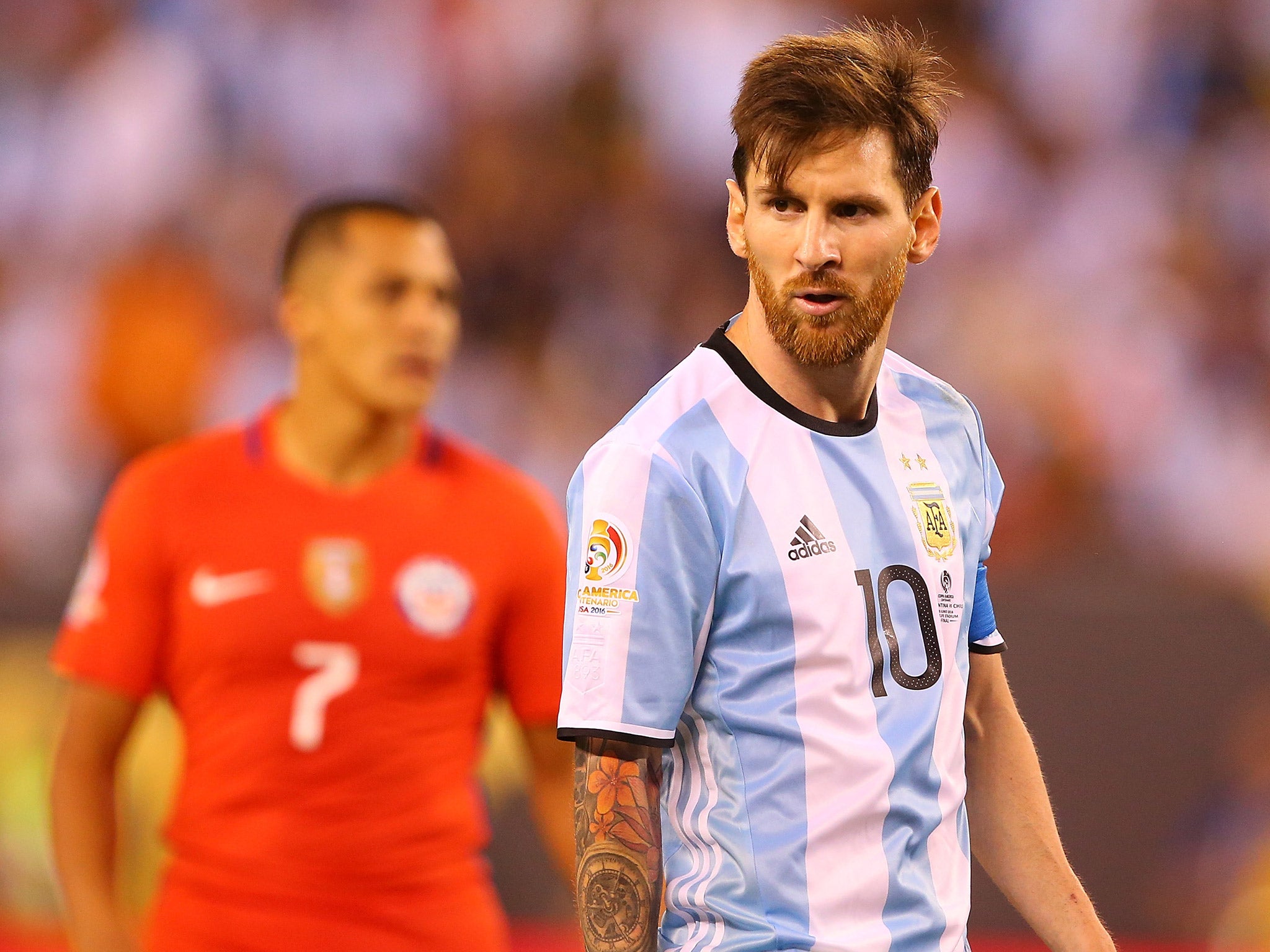Lionel Messi retires: Turning his back on Argentina proves how Barcelona star cannot compare to Diego Maradona
Retiring from international football at the age of 29 diminishes Messi's claim to being the greatest footballer to ever grace the game

Everyone will have a memory of Lionel Messi in white and sky blue, though few can surpass that indelible one which he provided us with two years ago last week.
It came at the end of a World Cup match that Iran, the opponents that day, turned into one of the great containment jobs of all time – and so nearly the greatest. In the 90th minute, the golden Messi left foot provided a moment of incredible and near impossible theatre. Statistically, it went down as his second one-on-one opportunity of the game but in reality it was him versus five when he dropped his shoulder, took the ball to the first man’s left and curled it around two defenders and the goalkeeper to secure a 1-0 victory. “Of course, we have a genius who is Messi,” his national team manager Alex Sabella said in Belo Horizonte that night. “Everyone would like to have a Messi. But he is ours.”
No longer. After missing a penalty in Argentina’s shoot-out defeat to Chile in the Copa America final, he has indicated that he is retiring from international football at 29 – no age for a player capable of feats of wonder. The regret reaches way beyond the borders of the country to all those for whom a World Cup without Messi is something profoundly diminished.
But the decision to step away from the Abicileste diminishes him, too. While the most fundamental measure of greatness in football is an ability to do what Messi did to Iran in Estadio Mineirao on that sweltering afternoon - or to Manchester City in the Nou Camp nine months later in a performance of sublimity which left El Pais reflecting “Que no pare nunca” (‘He never stops’) - the capacity to drag a national team up to a higher level contributes very substantially. That is because international football is so economically pure. It is the one realm of the world game in which no one can buy a way to success.
Sticking with it has been beyond Messi and in the conversation about which of he or Diego Maradona is the greatest – which will play out long after the collective memory of the two has long gone – the case for Maradona screams out now.
Watch back Mano de Dios, the excellent recent ITV film about how Maradona’s ‘Hand of God’ ended England’s 1986 World Cup campaign and you will discover that the controversy masked something more extraordinary still: Argentina lifting the trophy in Mexico City with a squad which, Maradona apart, was so very ordinary. He hauled them up that mountain to the Azteca Stadium.
In the current European Championships, we are witnessing two more in the same mould - Gareth Bale, of Wales, and Cristiano Ronaldo, of Portugal. Ronaldo’s quest to be considered a greater player than Messi is part of his weirdness. When manager at Real Madrid, Rafael Benitez found that Ronaldo only had eyes for the Champions League games and the Clasicos because they were the ones which might help his quest to beat Messi to the Ballon d’Or. But at 31, an age by which when some of his ilk have called it a day on their nation, Ronaldo’s quest to drive his country on is appealing - even if the histrionics do reveal the incredible ego within.
So, too, Bale’s transparent love of his own nation. The 26-year-old is such a superstar that he need do no more than take a ball onto the field for his manager Chris Coleman and produce of his best. But knowing that the wider world was only really interested in his talisman, Coleman asked Bale to become a little more controversial with his comments and get the country heard in France. He has obliged, becoming the articulator of a spiky Welsh resolve in the past three weeks.
The relationship between Messi and Argentina has complicated this picture. His departure for Catalonia at the age of 13 contributed to that. The people of Buenos Aires - the portenos - expect their nation's stars to play for one of the city's clubs before they leave. But the 2014 World Cup demonstrated he had travelled well beyond all that. He was Argentina’s fulcrum. He was adored by the fans who revelled in the national pride which derived from him belonging to them, as they taunted the suffering Brazilians with their brash World Cup anthem Brasil, decime que se siente (‘Brazil, tell me how it feels’).
But the nation’s aspirations are subsidiary to his own, it now seems. “It was the thing I wanted the most, but I couldn't get it, so I think it's over," Messi said on Sunday night, closing the door on the Abicileste because he still only had a 2008 Olympic gold medal to show. “It's not meant for me. For me the national team is over. I've done all I can, it hurts not to be a champion.” ‘Tell me about it,’ his teammates might reasonably say. The sport in question is a team game. The ones who stand at the peak of its pantheon accept the vagaries of a penalty shootout when standing among their compatriots, however painful that might be. They know that there is a bigger cause.
Subscribe to Independent Premium to bookmark this article
Want to bookmark your favourite articles and stories to read or reference later? Start your Independent Premium subscription today.

Join our commenting forum
Join thought-provoking conversations, follow other Independent readers and see their replies